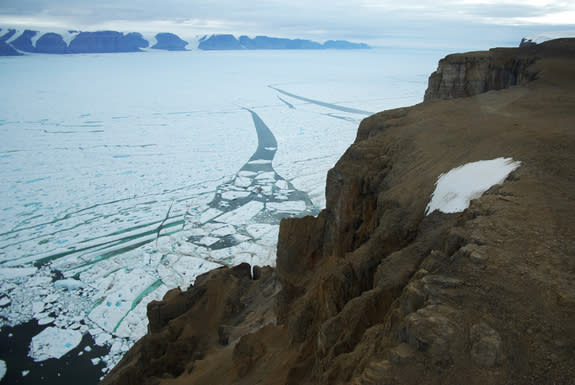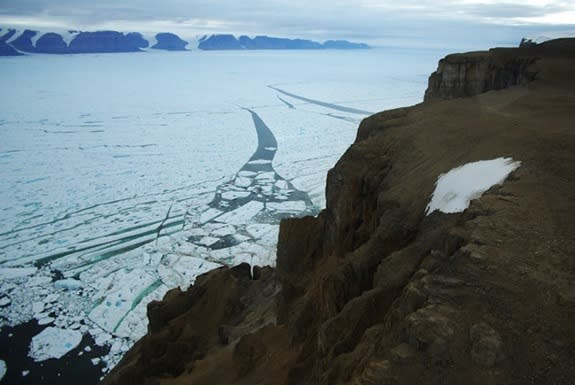Does the IPCC's Climate Change Report Still Matter?
More than 250 climate scientists are gathering in Sweden this week to finalize the Intergovernmental Panel on Climate Change's (IPCC) latest assessment on the science of global warming. The comprehensive and sweeping report is designed to help guide the world's policymakers. But elsewhere, some experts say it's time to reassess the entire IPCC process, which includes examining the very future of the organization.
As the IPCC prepares to release the first part of its new report, called the Fifth Assessment Report or AR5, on Friday (Sept. 27), some scientists are questioning whether these assessments still have an impact on governments, or whether the organization's mission needs to be re-evaluated to more effectively stimulate the stagnant waters of global climate policy.
"In the scientific community now, we're ready to have that discussion, and it will probably play out in the next year," said Heidi Cullen, vice president and chief climatologist for Climate Central, a nonprofit science journalism organization based in Princeton, N.J.
An international effort
The IPCC reports consist of four main sections: the Working Group I reporton the science of climate change; the Working Group II report on climate change impacts, adaptations and vulnerabilities; the Working Group III report on possible ways to mitigate climate change; and the Synthesis Report, which combines the main findings from all the working groups and integrates other relevant information for policymakers. [Best of the IPCC Report Leaks]
The assessments, which are typically released every five or six years, represent consensus on the state of climate change within the scientific community, and are thus considered the authority on the risks and impacts of global warming.
Yet, with the effects of climate change increasingly evident — including sea levels that are rising faster than anticipated and glaciers that are melting at unprecedented rates — policymakers may benefit from more frequent assessments that keep pace with observed changes across the globe, said James McCarthy, a professor of biological oceanography at Harvard University in Cambridge, Mass., and an author, reviewer and co-chairman of previous IPCC reports. McCarthy led Working Group II for the IPCC's Third Assessment, which was released in 2001.
"When we finished our work in 2001, there were very serious concerns about turning the crank again with Working Group I, II and III in the same mode," McCarthy told LiveScience. "We thought: Is there a more creative way? Is there a way that would make more efficient use of all the scientific time that goes into these reports?"
One possibility is to narrow the focus of the IPCC reports by creating more nuanced assessments that examine the regional effects of climate change, McCarthy said. This could help shape local responses, especially in countries or cities that are particularly vulnerable to the impacts of global warming, such as coastal regions that may be threatened by sea-level rise. [8 Ways Global Warming is Already Changing the World]
"There are areas where, if you direct the attention of the community in a more focused way, you could issue reports that would ideally advance the public knowledge and understanding of all this, instead of having to wait six years for another grand opus," McCarthy said.
Cullen said other scientists have similarly suggested focusing on regional effects, since there is still much to be learned about how climate change may impact individual cities and towns.
"There's a large portion of the scientific community that wants to focus on that scope," she said.
Assessing the state of climate change
The IPCC was established in 1988 by the United Nations to assess the most recent published and peer-reviewed studies on climate change, and to compile a comprehensive summary of the findings.
The organization does not conduct any original research, but drafts of the IPCC reportsundergo an extensive review process that involves thousands of scientists and government representatives. The reviewers participate on a voluntary basis, and the final report requires consensus among all the members.
This meticulous review process is what gives the IPCC reports their authority, but it is also largely why the assessments take so many years to put together.
"It's not that we spend years writing — a lot of that time is because these reports go through extensive reviews," said Richard Klein, a senior research fellow at the Stockholm Environment Institute in Sweden and one of the Working Group II authors for the IPCC's Fifth Assessment Report. "I'm not convinced that these reports can be done much faster. If you want smaller reports to have the same impact and same credibility, you still need to do this same review process." [4 Facts to Know About the IPCC Reports]
Yet Klein said the IPCC is aware of the debate surrounding its future, and the organization intends to discuss potential modifications to the assessment process at an upcoming meeting in Batumi, Georgia, in October.
"That is very much a discussion at the moment," Klein said. "It seems we do need these reports in order to keep informing the policy process with the best available science, but I think there is going to be an interesting discussion. It's too early to speculate on the outcome, but countries have been invited to submit their views of the IPCC and future assessments."
What should be done?
Elliot Diringer, a climate policy analyst and executive vice president of the Center for Climate and Energy Solutions — an Arlington, Va.-based independent nonprofit organization that seeks to address energy and climate-change issues — hopes the IPCC will consider overhauling the scope of its reports.
"The IPCC assessments are a critical sum-up, but are hardly the sum total of climate science," Diringer told LiveScience. "There's a whole lot of climate science that doesn't necessarily get into the reports."
Because the IPCC assessments require consensus among the authors and reviewers, the reports feature conservative estimates, and tend to underestimate, rather than overestimate, the risks and impacts of climate change. The conservative estimates in these reports, and their focus on summarizing global effects may not necessarily be useful for policymakers who are serious about taking action at a more local level, Diringer said. [The Reality of Climate Change: 10 Myths Busted]
"The information that is most critical for decision makers isn't necessarily found in the IPCC, because it is a summary," Diringer added. "What we need are more detailed analyses of how climate change is going to affect specific localities and sectors."
Still, experts agree that the IPCC has played a crucial role since its inception in 1988.
"The IPCC has been a great chapter in the history of science," said Bill McKibben, a renowned journalist on climate change, and founder of 350.org, an international organization that aims to cut carbon-dioxide emissions and raise awareness about global warming. "It was quite remarkable that the world's scientists were able to come to a working consensus on a difficult problem in chemistry and physics."
The report's shifting impact
In the late 1980s and early 1990s, the IPCC was key to establishing authority at a time when many scientists themselves were unsure if climate change was real, and if the effects were being caused by human activities.
Now, the scientific community has reached a much stronger consensus on the issue: A study from earlier this year found that out of nearly 12,000 journal articles from 1991 to 2011 that investigated the link between humans and climate change, 97 percent found that human activities are to blame for global warming.
"At this point, an awful lot of the drama is no longer with the scientists," McKibben told LiveScience. "We know most of what we're going to know — there's still plenty of great work to be done and things to be learned, but at this point, the drama is political instead."
And if there are still doubts about the reality of climate change, particularly in the political arena, perhaps the value of future IPCC reports should not be underestimated, Diringer said.
"I think there is still a need for these comprehensive assessments, since there are lingering doubts in some quarters," he said. "Having something like this from the scientific community still plays an important role. Hopefully, the need for massive tomes on basic climate science will diminish over time, and perhaps there will be a stronger need for more fine-grained analyses on the potential impacts at the local level."
Follow Denise Chow on Twitter @denisechow. Follow LiveScience @livescience, Facebook & Google+. Original article on LiveScience.
Copyright 2013 LiveScience, a TechMediaNetwork company. All rights reserved. This material may not be published, broadcast, rewritten or redistributed.



